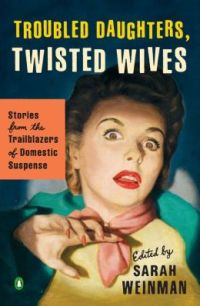Troubled Daughters, Twisted Wives by Sarah Weinman (ed.)
 Friday, January 17, 2014 at 8:33AM
Friday, January 17, 2014 at 8:33AM 
Published by Penguin Books on August 27, 2013
As academics often do, Sarah Weinman's introduction to this anthology takes a narrow theoretical approach to literature. Oddly, while she tells us that she values modern authors who expose the victimization of women by men, few of the stories she selected for this anthology follow that theme. In several stories, women feel abused by other women, and the female characters are often quite capable of dishing out their own abuse, usually in the form of murder. Moreover, not all of these "stories from the trailblazers of domestic suspense" are particularly domestic. While Weinman says she likes stories about strong, independent women, Margaret Millar's "The People Across the Canyon" is a sort of Twilight Zone story about a housewife who has trouble tearing herself away from the television, leaving it to her young daughter to reveal the puzzling nature of their new neighbors. One of the best stories, "Lost Generation" by Dorothy Salisbury Davis -- about a male teacher who is murdered by other males for a reason that is not entirely clear -- features no significant female characters at all.
Whether or not the anthologized stories are of the sort Weinman favors, she chose them well. "The Heroine" is one of Patricia Highsmith's earliest stories, yet it demonstrates her masterful ability to make the ordinary suspenseful. Lucille seems well suited to her new job as a governess, yet there's something odd about her, something that gives the reader cause to wonder whether she is well-suited to care for children. "The Purple Shroud," Joyce Harrington's clever story about a woman who weaves while her husband philanders, also features a woman who is not what she appears to be.
Largely through the unkindness of other women, the protagonist in Nedra Tyre's "A Nice Place to Stay" endures a life of hardship and homelessness until fate grants her wish for a place to stay (albeit in ironic fashion). Written in a similar first-person confessional style (informal yet elegant), Shirley Jackson's "Louisa, Please Come Home" is about a young women who runs away from home (if it's possible to do that at nineteen) and makes a jolting discovery about the family she abandoned.
My favorite character is the 87-year-old woman in Celia Fremlin's "A Case of Maximum Need" who told the social worker that she didn't need a telephone, and now look at all the trouble it's causing (particularly for the heavy breathers who call her). The best sentence in the anthology was written by Charlotte Armstrong in "The Splintered Monday," a story in which the reason for a mysterious death is a family secret: "Poor Alice, with no personal resources, but plenty of money, had taken to the one hobby that appealed to her: she had gone in for poor health."
Nearly all of the stories are good but some are less powerful. Vera Caspery's "Sugar and Spice" is an ordinary but well-told story of life-long mutual jealousy (leading to murder) involving a rich woman of plain appearance (repeatedly described as a "vipress") and the poor but beautiful woman who lives in her shadow. Barbara Callahan's "Lavender Lady" imagines a singer who tells of a traumatic childhood incident in a song that she has tired of singing. "The Stranger in the Car" by Elisabeth Sanxay Holding is a strong but rather dated and slightly melodramatic story about a father who tries to protect his daughter, although he's not sure who or what he's protecting her from.
I didn't quite believe the characters' motivations in Helen Nielsen's "Don't Sit Under the Apple Tree," a well-written story about a woman who plots revenge for the maddening calls she receives whenever her new husband is out of town, only to be challenged in her selection of the correct target. Also well-written, but sort of a nothing story, is "Everybody Needs a Mink" in which Dorothy B. Hughes imagines a mysterious old man giving a mink coat to a woman he has never met. The only story I disliked, "Mortmain" by Miriam Allen Deford, is about a nurse who decides to murder her dying patient (wouldn't it be easier to let him die?).
Weinman introduces each writer with interesting biographical details, but her need to explain why she chose each story for the anthology often drives her to reveal too much about the plots. While I'm not sure that Weinman's analysis adds anything of value to these stories, I commend her for anthologizing writers who deserve to be remembered.
RECOMMENDED
Reader Comments